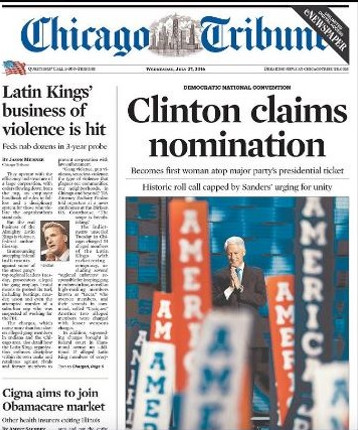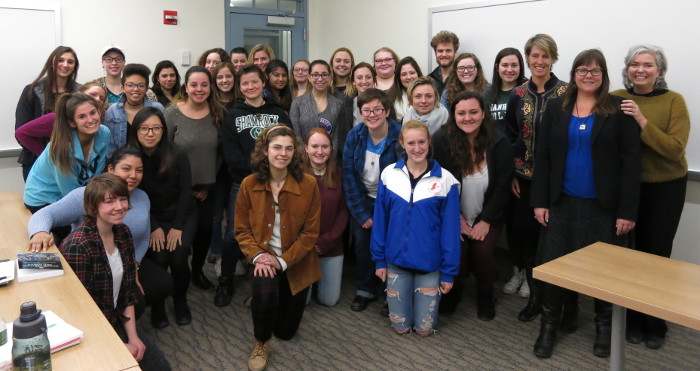Team-Taught Course Considers Barriers and Opportunities for Women in Politics
At the age of 5, Natassia Velez set her sights on a leadership role even more demanding than kindergarten class line leader. She had the will, the desire and the smarts. But when she boldly announced her intentions to become the president of the United States, she heard not encouragement, but laughter.
As she got older and prominent female politicians like Hillary Clinton emerged, Velez noticed a change in others’ response to her political aspirations. “People started realizing that it was more plausible for a female to be president, so they stopped laughing,” she said.
Now a senior international relations major, Velez enrolled in this spring’s “Women and Politics” course to learn more about the “barriers and pathways” for women like herself who hope to enter the political arena. Her experience so far has been both eye-opening and empowering.
Led by Kathleen Dowley, an associate professor of political science and director of the Women’s, Gender & Sexuality Studies Program, and KT Tobin, associate director of the Benjamin Center and sociology lecturer, the course’s first team-taught iteration offers an expansive look at the cultural, institutional and economic barriers to, as well as the opportunities for, women’s political participation in the U.S and around the globe.
Dowley, a European politics scholar, has traditionally taught “Women and Politics” as a comparative course, but incorporated more U.S. content to create a special “women’s suffrage edition,” made possible by funding from the Office of Academic Affairs, that links to the campus-wide commemoration of women’s suffrage in New York State. The conference, entitled “Women in Politics: Past, Present & Future,” begins on Friday, April 21 at the FDR Library in Hyde Park, N.Y., and concludes with events at the New Paltz campus on Saturday, April 22.
The course has benefited from the sociological expertise and political experience of Tobin, a New Paltz School board member from 2009-12 and current candidate for the New Paltz Village Board. Tobin examined women in Hudson Valley politics in her Ph.D. dissertation.

As the course looks at institutional barriers that discourage women’s participation, Tobin weaves in key sociological perspectives that explain phenomena like the gender-gap in political aspirations. “We talk a lot about gender socialization for children and young adults, and how that sets up a scenario by which women tend to have less ambition,” Tobin said.
Together, Dowley and Tobin guide students in addressing such questions as why the U.S. lags behind other Western democracies in women’s political participation and how greater representation might make a substantive difference in public policymaking. “Even though we have more women in the senate than ever before, it’s still 21 percent,” noted Dowley. “So much of the rest of the world exceeds that, so it gives me as a political scientist and a comparativist a chance to talk about the factors that help explain that.”
To discover what those factors are, and to pose potential solutions, students have immersed themselves in empirical journal articles that explore corrective policies such as quotas, reserved seats, campaign finance reform and public financing of campaigns that other countries have implemented to ensure adequate levels of female representation.
Working in small groups, students are collecting data on women’s representation in regions such as Europe, Latin America and the Caribbean, Sub-Saharan Africa, Asia and the Pacific. The students will create posters of their findings, aided by Research, Scholarship and Creative Activities Program Director Maureen Morrow, and they will present them at the Women’s Suffrage conference.

The course also features an array of guest lecturers. Susan Lewis, an associate professor of history and chair of the conference committee, presented an illuminating lecture on the women’s suffrage movement, New York state suffragists and less widely known figures who made significant contributions to the cause.
Rachel Somerstein, an associate professor of journalism, introduced the concept of news as a social construct that reflects the biases of those who report it, and its implications for the coverage (or absence) of women in traditional news outlets.
New York congressional and gubernatorial candidate Zephyr Teachout shared her personal experiences with pursuing public office, touching on several course themes, including women’s self-consciousness in entering the political arena and gendered news coverage of politicians. Teachout said she rejected the notion of the “right kind of politician,” and hoped to see more politicians who don’t fit the traditional mold, like teachers and bus drivers.

Velez said the course has affirmed her lifelong desire to enter politics. Teachout’s talk, in particular, dispelled one long-held notion. “When she ran for governor, she was single, and it was always my perception that that would be an issue…because there’s a certain amount of upholding traditional family values that is put upon women, and she surprised me that it wasn’t an issue. I thought that was inspiring because it reminded me that we can make our own pathways. We can be ourselves and still pursue politics,” she said.
Like Velez, Jesmine Romanelli ’19 (International Relations) has also held political ambitions from a young age. She gave a presentation on Hillary Clinton in her ninth grade public speaking class and has taken on leadership roles in student clubs since elementary school. Like Velez, she was also discouraged as a teenager from seeking a career in politics.
Both students speak about equity and the importance of female voices in public office, not just in addressing so-called “women’s issues” like childcare and elder care, but veterans benefits, climate change, renewable energy and resource allocation.
Both have been heartened to see female politicians emerge as key players nationally. Velez, the daughter of a veteran, idolizes New York senator Kirsten Gillibrand as a champion of veterans’ rights, and the half-Bengali, half-Italian Romanelli wants to see more women of color in politics. She has eagerly watched the rise of Hawaii congresswoman Tulsi Gabbard, a combat veteran and the first Hindu woman elected to Congress.
And having taken the course, they both have reason to believe that they, too, can fulfill their career aspirations.
In discussing all the barriers that women face in entering public office, Tobin emphasized one essential and often overlooked finding. In open contests with no incumbents on the ballot, women are just as likely to win as men – and in the last 15 years, actually have a slight advantage. “It’s important to understand things like gender socialization impacting political ambition, but it’s also important to recognize we don’t need to wait,” Tobin said.
This empowering message has shaped both the future Romanelli imagines for herself and her approach to daily living.
“A lot of women are afraid to ask for what they want or inquire about things, or push for what they want, and you kind of need to take a step back and say ‘I do deserve this, and it’s not wrong for me to feel this way’ and actually go through with it,” said Romanelli. “I think that’s one of the biggest things this class has taught me.”
—
For more information on “Women in Politics: Past, Present & Future,” a commemorative conference celebrating the centennial of women’s suffrage in New York State, visit the event website.
